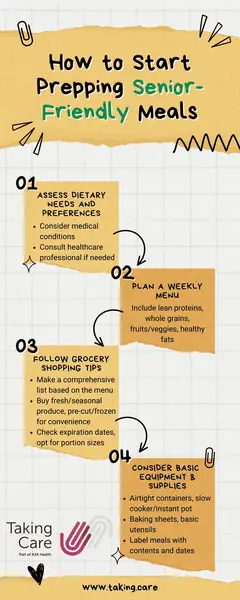Have you ever considered how your emergency preparedness strategy might need to be adjusted as you get older? Whether you are a senior yourself or you have older loved ones to look out for, it’s important to make sure you are ready for any situation that may arise. In this article, we will discuss how to tailor your emergency preparedness plan to suit the needs of seniors, regardless of age. From mobility issues to medical requirements, we’ve got you covered. Let’s get started!

Understanding the Unique Needs of Seniors
As we age, our bodies and minds undergo changes that can impact our ability to respond to emergencies effectively. Mobility issues, cognitive impairments, and chronic health conditions are just a few examples of factors that can make emergency situations more challenging for older adults. It’s crucial to take these unique needs into account when developing an emergency preparedness plan.
Considerations for Mobility Issues
Mobility issues can make it difficult for seniors to evacuate quickly in the event of a disaster. When creating your emergency preparedness plan, make sure to take into account any mobility limitations that you or your loved ones may have. Identify potential obstacles, such as stairs or narrow doorways, and come up with alternative evacuation routes.
Addressing Cognitive Impairments
Cognitive impairments, such as dementia or Alzheimer’s disease, can affect a senior’s ability to understand and follow instructions during an emergency. To address this issue, consider creating a simplified emergency plan with clear, easy-to-follow steps. Make sure that important information, such as emergency contact numbers and medical information, is easily accessible.
Managing Chronic Health Conditions
Seniors with chronic health conditions, such as diabetes or heart disease, may require special accommodations during an emergency. Make sure that you have an ample supply of necessary medications and medical supplies on hand at all times. Consider keeping a list of medications, dosages, and medical conditions in your emergency kit for easy reference.
Building Your Emergency Kit
Having a well-stocked emergency kit is essential for seniors to be prepared for any situation that may arise. When assembling your emergency kit, make sure to include supplies that address the unique needs of older adults. Here are some items to consider including in your emergency kit:
| Item | Purpose |
|---|---|
| Medications | To manage chronic health conditions |
| Medical supplies | Bandages, gauze, and other first aid items |
| Flashlight | To provide light in emergencies |
| Extra batteries | To power essential devices |
| Non-perishable food | To sustain you during a disaster |
| Bottled water | To stay hydrated in an emergency |
| Blankets | To stay warm in cold temperatures |
| Whistle | To signal for help if needed |
Organizing Important Documents
In addition to your emergency kit, it’s important to have copies of important documents readily available. These documents should include identification, insurance information, medical records, and emergency contacts. Consider keeping digital copies of these documents on a portable USB drive for easy access in case of an emergency.

Communication Strategies for Seniors
Communication is key during an emergency situation, especially for seniors who may need additional assistance. It’s important to have a communication plan in place to ensure that you can stay connected with loved ones and emergency services. Here are some strategies to consider:
Establishing a Communication Chain
Create a communication chain with family members, neighbors, and friends to stay informed during an emergency. Make sure that everyone knows how to reach each other and establish a designated meeting spot in case you are separated. Consider using a group messaging app to stay in touch easily.
Utilizing Emergency Alert Systems
Many communities offer emergency alert systems that provide real-time updates on weather warnings, road closures, and other important information. Make sure to sign up for these services and familiarize yourself with how to receive and respond to alerts effectively.
Seeking Assistance from Local Agencies
If you or your loved ones require additional help during an emergency, don’t hesitate to reach out to local agencies for support. Many communities offer programs and services specifically designed to assist seniors and individuals with disabilities during disasters.

Evacuation Planning for Seniors
In the event of a mandatory evacuation, it’s essential to have a solid evacuation plan in place. Consider the following tips to ensure a safe and efficient evacuation for seniors:
Preparing a “Go Bag”
Put together a small, lightweight “go bag” containing essential items that you can grab quickly in case of an evacuation. Include items like medications, important documents, a change of clothes, and a few days’ worth of non-perishable food and water.
Identifying Evacuation Routes
Map out several evacuation routes in advance so that you have multiple options to choose from in case one route becomes blocked or inaccessible. Make sure to consider your transportation options and factors like traffic congestion when planning your evacuation route.
Communicating Your Plan
Share your evacuation plan with family members, neighbors, and caregivers so that they know where you will be going and how to reach you. Make sure to keep them updated on any changes to your plan and establish a communication protocol in case you are separated during the evacuation.

Involving Caregivers and Support Networks
If you are a caregiver for a senior or have older loved ones who rely on your assistance, it’s crucial to involve them in the emergency preparedness process. Here are some tips for working with caregivers and support networks to ensure that everyone is on the same page:
Creating a Care Plan
Work together with your loved ones and their caregivers to create a comprehensive care plan that outlines specific needs, responsibilities, and emergency protocols. Make sure that everyone has a copy of the care plan and understands their role in the event of an emergency.
Establishing a Support Network
Build a support network of family members, friends, neighbors, and community resources that can provide assistance and support during an emergency. Share your emergency preparedness plan with your support network and make sure that everyone knows how to access important information and resources.
Conducting Regular Drills
Practice your emergency preparedness plan regularly with caregivers and support networks to ensure that everyone knows what to do in case of an emergency. Use these drills as an opportunity to identify any gaps or areas for improvement in your plan.

Conclusion
No matter your age, it’s important to be prepared for emergencies and disasters. By tailoring your emergency preparedness plan to suit the unique needs of seniors, you can ensure that you and your loved ones are ready for any situation that may arise. From addressing mobility issues to managing chronic health conditions, there are plenty of factors to consider when developing your emergency plan. Remember to stay informed, communicate effectively, and involve caregivers and support networks in the process. By taking these steps, you can be better prepared to handle emergencies at any age. Stay safe and be prepared!
